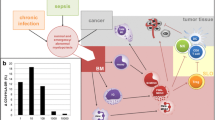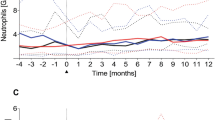Abstract
The availability of the myeloid hemopoietic growth factors (HGF) granulocyte- and granulocyte/macrophage-colony stimulating factor (G-CSF and GM-CSF) has enhanced the therapeutic index of high-dose chemotherapeutic antitumoral regimens (HDCT), as well as the rate of severe damage to immune competence. We investigated some immune functions before, during and after one course of HDCT for poor-risk breast cancer and compared the effects of G-CSF and GM-CSF on the immune recovery. They exerted different influences on the functions we examined and showed distinctive patterns of both qualitative and quantitative in vivo activities on the immune system. The main findings were that (a) granulocyte and lymphocyte recovery rates were faster in the patients receiving G-CSF; (b) looking at the lymphocyte compartment, this difference was restricted to the CD3+/CD8+ and CD56+ lymphocyte subsets; (c) the reconstitution rate of CD19+ lymphocytes was slow in both groups; (d) at the end of follow-up HLA-DR expression by CD3+ lymphocytes was higher in the GM-CSF group; (e) the lymphocyte proliferative capacity was restored at a faster rate in the GM-CSF group, whereas cytotoxic activities recovered better in the G-CSF group; (f) the early repopulating phase was characterized by higher interleukin-6 serum levels in the GM-CSF group. Overall, GM-CSF seemed to exert an earlier effect on all T lymphocyte subsets, preventing them from a complete drop during the long-lasting “nadir” of the cell count, whereas G-CSF appeared to boost them strongly, though a few days later, hastening their final recovery. The distinct pattern of the cytokine cascade induced by each factor, consistent with the different functional changes, seemed to account for the peculiarities of their immune modulations.
Similar content being viewed by others
Author information
Authors and Affiliations
Additional information
Received: 4 August 1998 / Accepted: 30 April 1999
Rights and permissions
About this article
Cite this article
Setti, M., Bignardi, D., Ballestrero, A. et al. The induction of distinct cytokine cascades correlates with different effects of granulocyte-colony stimulating factor and granulocyte/macrophage-colony-stimulating factor on the lymphocyte compartment in the course of high-dose chemotherapy for breast cancer. Cancer Immunol Immunother 48, 287–296 (1999). https://doi.org/10.1007/s002620050577
Issue Date:
DOI: https://doi.org/10.1007/s002620050577




